Students traveled to Nepal to conduct workshops
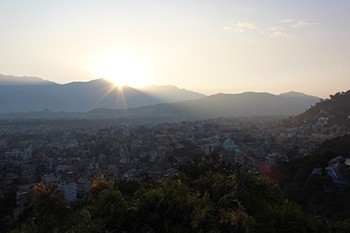
Over winter break, juniors James Nugent and Charlotte Hargest traveled with Music Education Professor Jennifer McDonel to Nepal to teach music to children, provide music education workshops to music teachers and do research on music education practices in Nepal.
The Scholar-Citizen Initiative, Scholar-Citizen-in-Action and Music Department grants sponsored Nugent and Hargest, while McDonel was funded by a College of Visual and Performing Arts faculty research grant.
The workshops were conducted in the Nepali cities of Kathmandu, Jhapa and Pokhara in conjunction with Sumit Pokhrel, chair of the MusicArt Society in Kathmandu.
In the early childhood demonstration courses co-taught by McDonel, Hargest and Nugent, children sang tunes while also being able to echo tonal and rhythm patterns.
“They were able to sing in tune and chant back more complex rhythm patterns than we expected,” Nugent said.
McDonel explained that the children of Nepal show high achievement in those areas at a young age because singing and dancing are integral parts of Nepali culture. Through song, dance and singing, their exposure to music results in a high absorption of initial music processes and quickly breaks the code of music, she said.
Sunrise over the Himalayan mountains. Video credit: James Nugent
“It underscores the importance of having a rich exposure to music and the arts from a very early age,” McDonel said.
Another part of the trip – and the reason for student funding – was having workshops that coach students and teachers about the importance and aspects of vocal health.
“We attempted to connect what we learned about music learning theory to aspects of vocal health,” Hargest said. “It was a new topic, but it connected back to the workshops Dr. McDonel had presented on her trip last year.”
The interrelation of breath, movement and audiation – understanding the deep structure of music – were the primary focus of their presentations.
“We were doing things that must have looked ridiculous to them,” Hargest said. “Vocal health is very physical. I don’t think people realize that singing isn’t just in the throat; it’s in the whole body.”
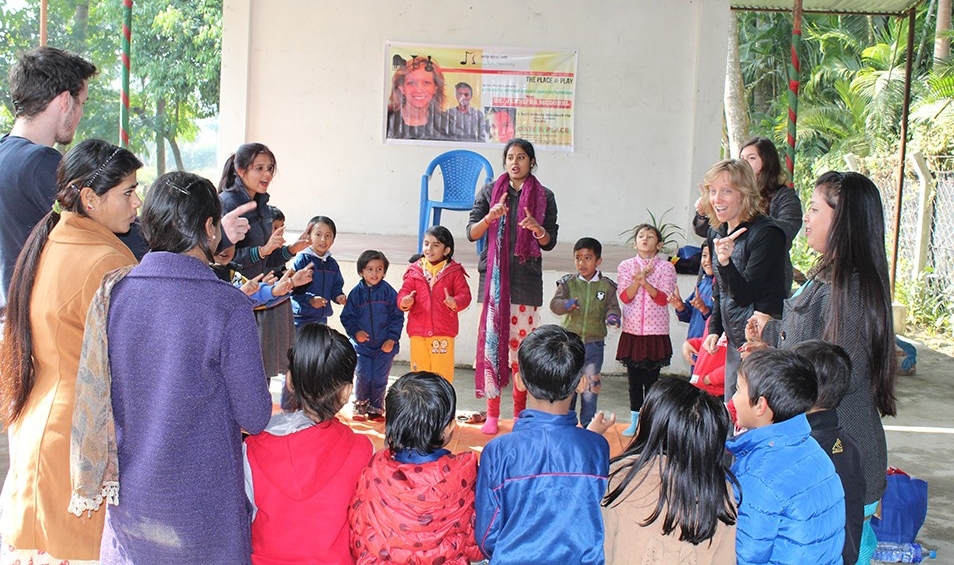
Nugent, McDonel and Hargest conduct a workshop with Nepali teachers and students.
That aspect of singing led to teaching the students and teachers in Nepal with unique – and seemingly silly – movements.
“The movements have purpose, both in terms of vocal health and audiation,” Hargest said. “Vocalists must be very aware of the body. That was one of the challenges, but also one of the most fun parts of teaching our vocal health piece.”
Hargest and Nugent made the participants get out of their comfort zone during their presentations, but none of the students seemed phased; they smiled the entire time, with the smiles only occasionally shifting to show a degree of reflection.
“We connected the movement back to everything that we had discussed – the reasons behind why we were moving like that,” Hargest said. “We could tell that they were taking in everything we taught because of how their faces would change during the exercises.”
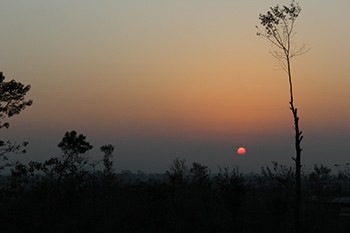
While in Nepal, McDonel, Nugent and Hargest also conducted research to examine the impact of initial professional development workshops on music teachers’ self-efficacy and perceptions of student learning in Nepal. Exposing Nugent and Hargest to field research processes was one of McDonel’s purposes for the trip.
“They helped write the research proposal, collected data in the field and will now work on analyzing and reporting the results and conclusions,” McDonel said.
The trio plan on presenting the joint findings at the Gordon Institute for Music Learning’s Sixth International Conference on Music Learning Theory. McDonel also hopes to work with her students on submitting a research paper for a peer-reviewed journal to experience the full research cycle as undergraduates.
Both students are using the unique experience of traveling abroad to have a positive impact on their academic and professional careers.
“It made me much more confident,” Nugent said. “Going to Nepal and being in front of these people and physically teaching the students and the teachers was a relevant and important application of what we have learned. We know how to deliver that information more effectively.”
Hargest felt a strengthened sense of purpose upon returning to the United States. The trip re-affirmed her desire to be a music educator.
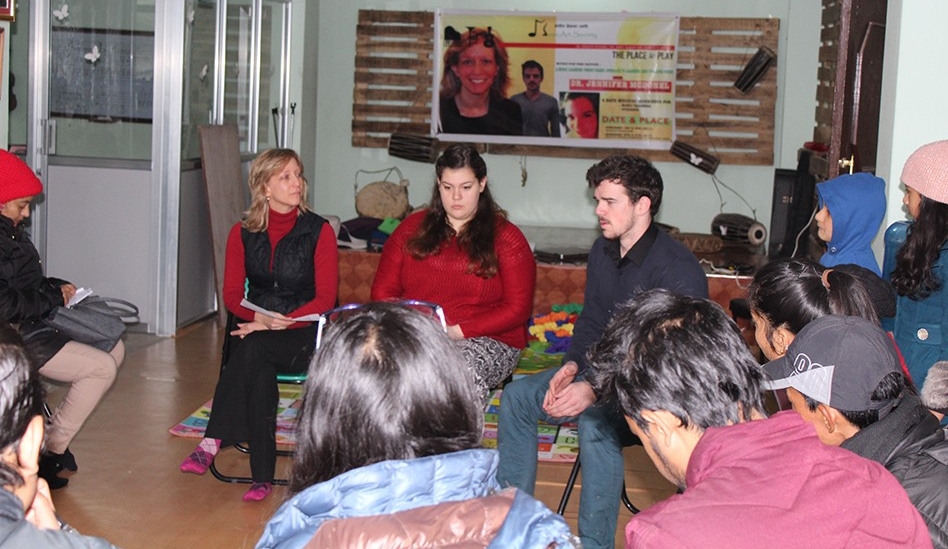
McDonel (left), Hargest (center) and Nugent (right) conduct a workshop with Nepali teachers and students.
“It broadened my horizons,” Hargest said. “I can also help people outside of my immediate reach. I can continue helping the people in Nepal. I’m continuing and expanding a fundraising effort called Drumming for Drums for our chapter of the National Association for Music Education and getting the rest of the organizations from our music department involved.”
The once-in-a-lifetime opportunity led to both students traveling to Asia for the first time.
“The Himalayas really stood out to me,” Nugent said as he described the beauty of the terrain. “I got an amazing time lapse of the sun rising over Machhapuchhre in the Annapurna mountain range, which is one of the tallest mountains in the world.”
Hargest noticed the architectural differences in Nepal’s capital city. She drew an immediate comparison to the design of American cities, which possess monochromatic skyscrapers and towering buildings. Kathmandu is a sprawling metropolis – but lacks the traditional skyscraper.
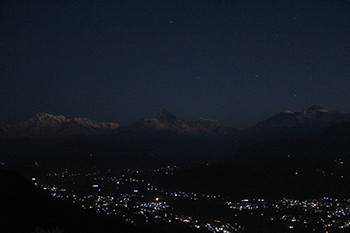
“The sprawl seems even more widespread than in the United States, but with buildings that are square and only four stories tall,” she said. “The city is covered in colors. Each building is painted with a different pastel color, with lots of bright, primary-colored Buddhist prayer flags hanging all around the city.”
An aspect of the Nepali culture noticed by both Hargest and Nugent was the enthusiasm for new ideas.
“The amount that people wanted to learn struck me,” Hargest said. “That really moved me, especially as someone who wants to be an educator.”
While Nugent and Hargest noticed that hunger for learning when shared a special moment with the children while they played guitar and sang.
“They were always asking questions,” Nugent said. “They didn’t understand the material immediately, but they wanted to. You could almost see the hunger to learn, both in the teachers and in their students.”
Though the trip is over, Hargest and Nugent don’t want to stop helping others learn music.
“Everyone deserves it,” Hargest said. “All kids deserve a quality music education.”
Hargest, McDonel and Nugent agreed that the mission is bigger than all of them, but that it was an honor and a privilege to be able to help Pokhrel and the MusicArt Society’s mission in Nepal.
“We are so fortunate at Radford University to have the support needed to reach out globally and give our students a glimpse of the bigger world in which we live,” McDonel said. “Our students represented Radford University extremely well. This experience will be one that none of us will ever forget.”
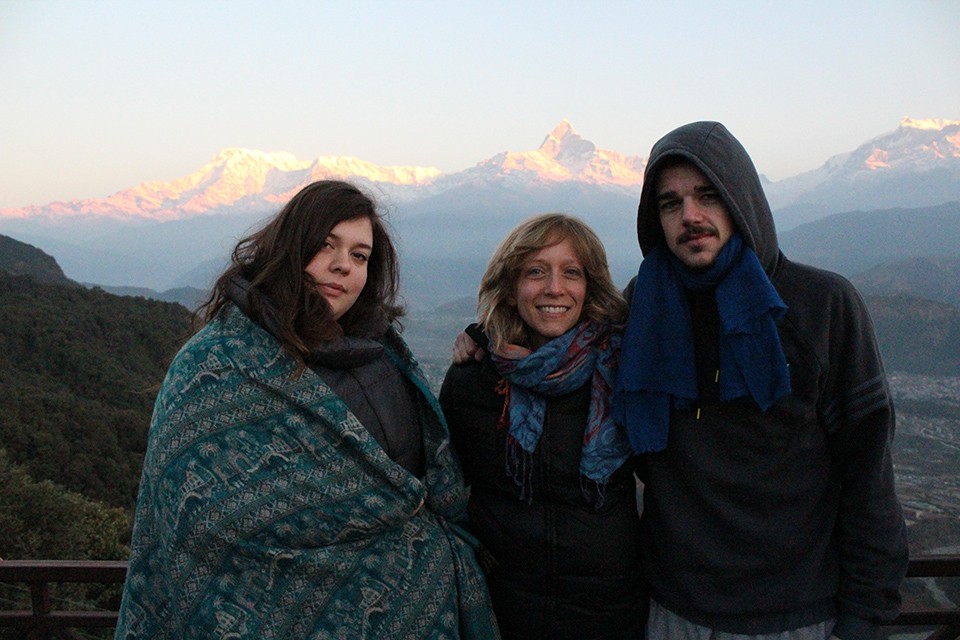
Hargest (left), McDonel (center) and Nugent (right) in front of the Himalayan mountains.